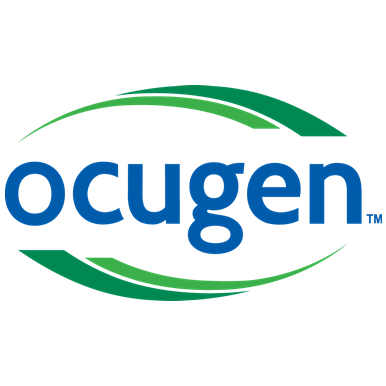
Research News and Market Data on OCGN
October 9, 2024
MALVERN, Pa., Oct. 09, 2024 (GLOBE NEWSWIRE) — Ocugen, Inc. (“Ocugen” or the “Company”) (NASDAQ: OCGN), a biotechnology company focused on discovering, developing, and commercializing novel gene and cell therapies, biologics, and vaccines, today announced that the U.S. Food and Drug Administration (FDA) has lifted the clinical hold on the investigational new drug application for the Phase 1 clinical trial evaluating OCU200, a recombinant fusion protein consisting of tumstatin and transferrin, for treating diabetic macular edema (DME).
“We are excited to launch the Phase 1 clinical trial for OCU200, which is designed to treat patients with DME,” said Dr. Arun Upadhyay, Chief Scientific Officer and Head of Research & Development at Ocugen. “Approximately 30 to 40% of DME patients are refractive to current anti-VEGF therapies. OCU200 targets the underlying disease mechanisms through the integrin pathway and holds promise to provide benefits to all DME patients, including non-responders to currently approved therapy.”
OCU200 possesses unique features that potentially enable it to treat vascular complications of DME. Tumstatin is the active component of OCU200 and binds to integrin receptors, which play a crucial role in disease pathogenesis. Transferrin is expected to facilitate the targeted delivery of tumstatin into the retina and choroid and potentially help increase the interaction between tumstatin and integrin receptors.
“I look forward to bringing OCU200 into the clinic and advancing this important candidate in Ocugen’s portfolio for treating blindness diseases,” said Dr. Huma Qamar, Chief Medical Officer at Ocugen. “DME is becoming more prevalent as the number of people with diabetes in the U.S. rises, making the condition even more imperative to address.”
This is a multicenter, open-label, dose-ranging study with 3 cohorts in the dose-escalation portion assessing safety of OCU200 and in the fourth cohort a combination of OCU200 (MTD) with anti-VEGF following sequential intravitreal administration.
DME is one of the most common vision-threatening diseases occurring in people with diabetes and includes blurriness in vision and progressive vision loss as the disease progresses. Approximately 746,000 people in the United States are affected with DME.
The Company intends to pursue additional indications for OCU200 to potentially treat diabetic retinopathy and wet age-related macular degeneration, which combined affect nearly nine million Americans.
About Ocugen, Inc.
Ocugen, Inc. is a biotechnology company focused on discovering, developing, and commercializing novel gene and cell therapies, biologics, and vaccines that improve health and offer hope for patients across the globe. We are making an impact on patients’ lives through courageous innovation—forging new scientific paths that harness our unique intellectual and human capital. Our breakthrough modifier gene therapy platform has the potential to treat multiple retinal diseases with a single product, and we are advancing research in infectious diseases to support public health and orthopedic diseases to address unmet medical needs. Discover more at www.ocugen.com and follow us on X and LinkedIn.
Cautionary Note on Forward-Looking Statements
This press release contains forward-looking statements within the meaning of The Private Securities Litigation Reform Act of 1995, including, but not limited to, strategy, business plans and objectives for Ocugen’s clinical programs, plans and timelines for the preclinical and clinical development of Ocugen’s product candidates, including the therapeutic potential, clinical benefits and safety thereof, expectations regarding timing, success and data announcements of current ongoing preclinical and clinical trials, the ability to initiate new clinical programs; statements regarding qualitative assessments of available data, potential benefits, expectations for ongoing clinical trials, anticipated regulatory filings and anticipated development timelines, which are subject to risks and uncertainties. We may, in some cases, use terms such as “predicts,” “believes,” “potential,” “proposed,” “continue,” “estimates,” “anticipates,” “expects,” “plans,” “intends,” “may,” “could,” “might,” “will,” “should,” or other words that convey uncertainty of future events or outcomes to identify these forward-looking statements. Such statements are subject to numerous important factors, risks, and uncertainties that may cause actual events or results to differ materially from our current expectations, including, but not limited to, the risks that preliminary, interim and top-line clinical trial results may not be indicative of, and may differ from, final clinical data; that unfavorable new clinical trial data may emerge in ongoing clinical trials or through further analyses of existing clinical trial data; that earlier non-clinical and clinical data and testing of may not be predictive of the results or success of later clinical trials; and that that clinical trial data are subject to differing interpretations and assessments, including by regulatory authorities. These and other risks and uncertainties are more fully described in our annual and periodic filings with the Securities and Exchange Commission (SEC), including the risk factors described in the section entitled “Risk Factors” in the quarterly and annual reports that we file with the SEC. Any forward-looking statements that we make in this press release speak only as of the date of this press release. Except as required by law, we assume no obligation to update forward-looking statements contained in this press release whether as a result of new information, future events, or otherwise, after the date of this press release.
Contact:
Tiffany Hamilton
Head of Communications
[email protected]